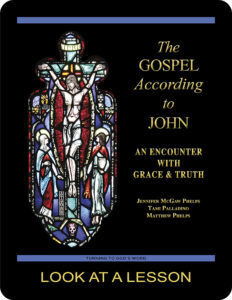First Letter of John
 The First Letter of John describes perfect love—both its conditions and its benefits. This letter portrays perfect love as the Christian ideal and the goal toward which all Christians must strive. The concept, however, has become diluted due to the deterioration in meaning of the word perfect. What does it mean to have perfect love?
The First Letter of John describes perfect love—both its conditions and its benefits. This letter portrays perfect love as the Christian ideal and the goal toward which all Christians must strive. The concept, however, has become diluted due to the deterioration in meaning of the word perfect. What does it mean to have perfect love?
The Greek word τέλειος (teleios) and the Latin perfectus ultimately have similar meanings, though etymologically they are somewhat different. The Greek word is an adjective that comes from a noun that means “outcome,” “result,” or “end,” and so means “perfect,” “accomplished,” “complete.” The Latin perfectus comes from the prefix per– meaning “through” and the verb facio meaning “do” or “make,” and so means “carried out” or “accomplished.” Both of these words, then, come to mean something like “done through to the end.”
So what is perfect love? It is love that has reached its end or goal—it is complete. In John’s view of love, then, love is not merely a passive feeling. Instead, love is an active striving toward a set goal. What do you think that goal is? Do you think that your love of God is moving you toward that goal?
related topics: agape; First Letter to the Corinthians; mercy; perfect; philia; you are my friends
you also may like our study of the Gospel According to John
 The Gospel According to John: An Encounter with Grace & Truth, a 25-lesson Catholic Bible study with an imprimatur, examines the Fourth Gospel’s view of Jesus Christ as the Son of God, with special emphasis on the institution of the sacraments of the Church as the means by which Christians are purified and made holy. This recently revised study includes maps and additional commentary, and takes a closer look at the way in which Jesus relates to individual men and women. Click on the book’s cover to view a sample lesson.
The Gospel According to John: An Encounter with Grace & Truth, a 25-lesson Catholic Bible study with an imprimatur, examines the Fourth Gospel’s view of Jesus Christ as the Son of God, with special emphasis on the institution of the sacraments of the Church as the means by which Christians are purified and made holy. This recently revised study includes maps and additional commentary, and takes a closer look at the way in which Jesus relates to individual men and women. Click on the book’s cover to view a sample lesson.
 Click on the picture of the statue of Moses with horns (above) to learn more about Lost in Translation. A new entry is archived each Monday. Contact us to receive Lost in Translation by email every week. You may use any of the contact links on our website to ask Matthew a question.
Click on the picture of the statue of Moses with horns (above) to learn more about Lost in Translation. A new entry is archived each Monday. Contact us to receive Lost in Translation by email every week. You may use any of the contact links on our website to ask Matthew a question.
